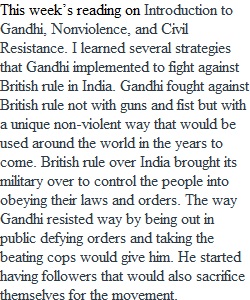


Q Reading Reflections and Definitions (15% of your grade) Peace studies involves multiple levels of engagement. Peace studies not only involves the learning process of the individual, but also the application of this newly acquired knowledge at a personal, communal and international level. Directions: Read the assigned readings for the week and write a 250 word reflection and include five (5) new peace studies definitions and/or concepts encountered throughout the reading. Definitions and/or concepts are listed after the reflection and written in your own words. View this additional instructional video entitled, PEAC 101: Reading/Video Reflection Assignment (5:00 mins) linkedhere (Links to an external site.) Questions to Consider • What questions do I have about this reading? If you could ask the author a question, what would it be? • How does this reading relate to my life? • How does this reading relate to other readings we have completed for this course? • Are there any new ideas or definitions presented in this reading? Quotations: If you directly quote the text or any other resource, you must cite the information properly using APA format. See this rubric Download rubric and a sample Reading Reflection linked here Download here for your reference. You may be asked to share about your reading reflection in small zoom breakouts during our required zoom sessions. APA formatting: See the Appendix of your syllabus for more details Format for citations within the text Review the following example to learn how to cite a reference within the text of your research paper using the APA format. Example: Structural violence was a concept coined by Johan Galtung during his work in the 1960’s (Galtung, 1969, p.245). List sources alphabetically at the end of your paper under the heading “Bibliography”: Example below: Bibliography Mora, M. (2003). The imagination to listen: Reflections on a decade of Zapatista struggle. Social Justice, 30(3), 17–31. Additional resources: APA: http://www.apastyle.org/ (Links to an external site.) Submit: Via Text entry or a file upload View Rubric
View Related Questions